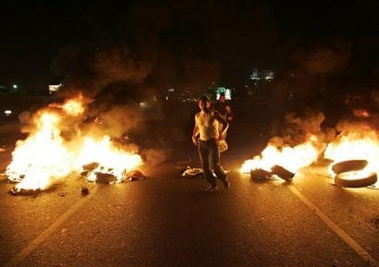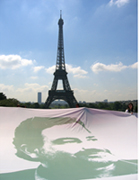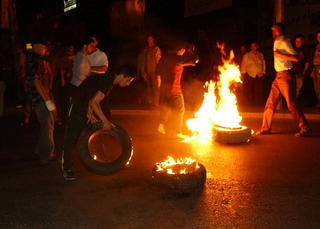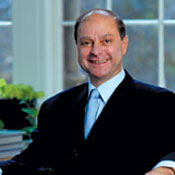 Lebanese Hizbollah supporters burn tyres during a protest in Beirut June 1, 2006, over a local comedy television programme (‘Basmat Watan’) broadcast on Thursday in which a comedian mocked the character of Hizbollah leader Sayyed Hasan Nasrallah . REUTERS/Ali Lamaa (LEBANON) Pls click READ MORE to view all pictures of this unfortunate event
Lebanese Hizbollah supporters burn tyres during a protest in Beirut June 1, 2006, over a local comedy television programme (‘Basmat Watan’) broadcast on Thursday in which a comedian mocked the character of Hizbollah leader Sayyed Hasan Nasrallah . REUTERS/Ali Lamaa (LEBANON) Pls click READ MORE to view all pictures of this unfortunate event
"God, Nasrallah and all of the southern suburbs," chanted the men, waving yellow Hizbullah flags. After the program ended late on Thursday, Hizbullah followers also staged nighttime protests in various parts of the capital, in several towns in southern Lebanon, and in the Bekaa Valley near the border with Syria. The protests only ended after Nasrallah personally made a plea for calm on television during the night in order "to protect the country’s security and stability".
He also called for the need to find ways to protect "political and moral values". "Three of us spent the night in hospital for treatment after we were beaten" by protestors in Beirut’s Christian neighborhood of Ashrafiyeh, said Sami Gemayel, son of former president and the supreme chief of the Christian party Kataeb, Amin Gemayel. Gemayel said that he suffered bruising to his back, and university students Gilbert Rizk and Bassam Samarani underwent surgery on their faces and noses. "We were awaiting the army to stop the protestors from entering Ashrafiyeh, and we did not want them to enter Monot street," which is lined with restaurants and nightclubs, he said.
 Reporters Without Borders today paid tribute to murdered Franco-Lebanese journalist Samir Kassir when 50 of its activists unfurled a giant Lebanese flag (150 sq. metres) bearing his portrait at Human Rights Plaza in Paris.
Reporters Without Borders today paid tribute to murdered Franco-Lebanese journalist Samir Kassir when 50 of its activists unfurled a giant Lebanese flag (150 sq. metres) bearing his portrait at Human Rights Plaza in Paris.
The worldwide press freedom organisation
Aoun, a native of Lebanon, earned his doctorate from the department of linguistics and philosophy at the Massachusetts Institute of Technology in 1981. He said he’s looking forward to working with faculty, administration, students and alumni."As president, my first priority will be working with all of these constituencies to build on the momentum the university has created to propel it to even greater levels of excellence," Aoun said in a statement.
by Salim Yassine
 BEIRUT (AFP) – Israeli fighter jets bombed Palestinian and Lebanese militant targets in Lebanon after guerrillas fired rockets into Israel in the fiercest cross-border violence seen this year. A fighter with the Lebanese Hezbollah militia and a member of a Syrian-backed radical Palestinian group were killed in the Israeli raids, while attacks from Lebanon left two Israeli soldiers wounded.
BEIRUT (AFP) – Israeli fighter jets bombed Palestinian and Lebanese militant targets in Lebanon after guerrillas fired rockets into Israel in the fiercest cross-border violence seen this year. A fighter with the Lebanese Hezbollah militia and a member of a Syrian-backed radical Palestinian group were killed in the Israeli raids, while attacks from Lebanon left two Israeli soldiers wounded.
Each side blamed the other for the tit-for-tat attacks on the border, which remains highly volatile six years after Israel ended its 22-year occupation of southern Lebanon in May 2000. UN peacekeepers later said they had brokered a ceasefire, and calm appeared to have returned to the volatile area by early evening.
"Following intensive contacts with all parties throughout Sunday, UNIFIL has succeeded in obtaining a ceasefire which should take effect on the ground," Milos Strugel, spokesman for the UN Interim Force in Lebanon, told AFP.
Residents of the northern Israeli towns of Kiryat Shmona and Nahariya were ordered into shelters for several hours amid the fierce shelling but were later given the all-clear.
By Leila Hatoum
 BEIRUT: The speaker of Lebanon’s Parliament insisted Thursday that Damascus "welcomes and encourages" the Lebanese national dialogue and "has no problems with it." Nabih Berri, who made the comments during a celebration of Liberation Day six years after the Israeli withdrawal from most of the country’s Southern territories, said: "Lebanon is being used to besiege Syria and Syria is being used to hit the last vestiges of resistance and defense line against Israel in Lebanon.
BEIRUT: The speaker of Lebanon’s Parliament insisted Thursday that Damascus "welcomes and encourages" the Lebanese national dialogue and "has no problems with it." Nabih Berri, who made the comments during a celebration of Liberation Day six years after the Israeli withdrawal from most of the country’s Southern territories, said: "Lebanon is being used to besiege Syria and Syria is being used to hit the last vestiges of resistance and defense line against Israel in Lebanon.
"This way we will all be losers," he warned. "I call for the establishment of a true Lebanese-Syrian dialogue.
"I wonder why things are always portrayed in such a way that Syria is the one that stands as a barrier in the face of demands imposed on it," he added. "Lebanon, on many occasions has refused proposals as well."
Lebanese participants at the national dialogue table – as well as UN Security Council Resolution 1680 – have requested that Syria establish diplomatic ties with Lebanon and demarcate the countries’ border.
Syria has not yet given Lebanese Premier Fouad Siniora the green light to visit Damascus to discuss these matters, despite the fact that Resolution 1680, issued last week, "strongly encourages the Syrian government" to do so.
Berri had stormed out of a Parliament session Tuesday after a heated debate with MP and former Minister Bahij Tabbara, suspending it less than an hour after its start. The conflict with Tabbara was over Syrian-Lebanese relations, when Tabbara asked: "We want to know if the open doors to our officials in Syria were those of Syria’s prison doors, or what?"
Berri had made a statement on Monday that "Damascus’ doors are open for any Lebanese official," referring to a possible open road for Siniora to visit Damascus.
by Muntasser Abdallah
 SIDON, Lebanon (AFP) – A leader of the Palestinian militant group Islamic Jihad, Mahmoud al-Majzub, has been killed in a car bomb attack in Lebanon’s main southern city of Sidon. Majzub’s brother Nidal, who had been beside him at the time of the blast, was killed instantly, while the Jihad militant was taken to hospital gravely wounded.
SIDON, Lebanon (AFP) – A leader of the Palestinian militant group Islamic Jihad, Mahmoud al-Majzub, has been killed in a car bomb attack in Lebanon’s main southern city of Sidon. Majzub’s brother Nidal, who had been beside him at the time of the blast, was killed instantly, while the Jihad militant was taken to hospital gravely wounded.
"Mahmoud al-Majzub succumbed to his wounds despite all the efforts to save his life," said a source from Sidon hospital where he was being treated hours after the blast.
Islamic Jihad, one of the most extreme Palestinian movements and responsible for all the most recent suicide attacks inside Israel, vowed to take revenge. But the Israeli army insisted it was not responsible.
By Rym Ghazal
 BEIRUT: A Lebanese soldier died in hospital on Friday, two days after being wounded in clashes between the army and pro-Syrian Palestinian gunmen near the Syrian border.
BEIRUT: A Lebanese soldier died in hospital on Friday, two days after being wounded in clashes between the army and pro-Syrian Palestinian gunmen near the Syrian border.
In the latest development since the violence, officials confirmed that trucks carrying arms and members of the Fatah al-Intifada had in fact entered Lebanon from Syria, after initially denying such reports.
Corporal Mustafa Medlej, 21, died in hospital in the southeastern village of Jeb Janine after sustaining two head wounds during clashes on Wednesday between Lebanese troops and Fatah al-Intifada militants in the mountainous area of Halwa-Yanta, located about three kilometers from the Syrian border, according to an army statement.
"There was a redeployment of men and arms in the posts held by Fatah al-Intifada on Wednesday and Thursday night," the statement said.
"Several of the Palestinian fighters involved in the shooting of Lebanese soldiers have been identified and they will be arrested immediately and prosecuted by the Lebanese judiciary," he added.
Security sources told The Daily Star that the army had asked that three members of Fatah al-Intifada be handed over, not two as had been previously reported. The three are said to be responsible for starting the incident Wednesday.
Initial reports said Fatah al-Intifada had received late Wednesday from Syria some 50 new members and five trucks laden with arms and ammunition to reinforce their positions.
اوقاف العائلة على ذاتها
١– كنيسة سيدة عجلتون: سنة ١٦٤١ ابتنى ابو نوفل كنيسة وعين لها كاهناً يُقيم القداس فيها دائماً
"دويهي" وهذه الكنيسة هي السيدة في عجلتون (المقاطعة الكسروانية ص ٧٣) وفي الجامع المفصل
ص ٤٤٦ والمطران دريان في معرض كلامهما عن البطريرك طوبيا الخازن يقولان انه: دفن في
كنيسة السيدة المختصة بعائلته.
٢– مار الياس بلونه: سنة ١٦٦٤ جدد الشيخ نمر ابن ابي نصيف الخازن دير مار الياس بلونه.
٣– مار الياس غوسطا: سنة ١٦٨٠ بدأ الشيخ ابو قنصوه بناء دار عظيمة في غوسطا تلاصقها من
الجهة القبلية كنيسة على اسم مار الياس الحي وتم بناؤها ١٦٨٩ (المقاطعة الكسروانية).
٤– مار مارون كفردبيان: في سنة ١٦٩١ في ٢٨ ايلول كان مقتل زعرور وقيل انه بسبب زعرور
وعصابته اضطر اولاد ابي نوفل ان يبنوا البرج المشهور في مزرعة كفردبيان، وجعلوه طابقين،
وما تزال في جدرانه المرامي التي كانوا يطلقون منها الرصاص (المقاطعة الكسروانية ص ٩٠).
٥– مار انطونيوس بقعاته: انشأه البطريرك طوبيا الخازن اذا كان بعد مطراناً قبل انعقاد المجمع اللبناني،
لان السمعاني في المجمع المذكور نقل الرهبان منه (الجامع المفصل ٥٠٩).
By SAM F. GHATTAS, Associated Press Writer
 BEIRUT, Lebanon – The U.N. Security Council’s call for Syria to establish diplomatic ties with Lebanon will likely only stiffen Damascus’ resolve against a move it has steadfastly rejected for six decades. At least three factors are at work to discourage Syria from heeding the U.N. resolution, aimed at restoring Lebanon’s sovereignty following Syria’s 29-year occupation of its smaller neighbor.
BEIRUT, Lebanon – The U.N. Security Council’s call for Syria to establish diplomatic ties with Lebanon will likely only stiffen Damascus’ resolve against a move it has steadfastly rejected for six decades. At least three factors are at work to discourage Syria from heeding the U.N. resolution, aimed at restoring Lebanon’s sovereignty following Syria’s 29-year occupation of its smaller neighbor.
Uppermost among them, the resolution cannot be enforced. That makes it a piece of "propaganda with no political value that could provoke the Syrians and undermine resumption of relations," said Sateh Noureddine, managing editor of a pro-Syrian Lebanese newspaper, As-Safir.
 Nayla Razzouk, AFP,
Nayla Razzouk, AFP,  June 1, 2006,
June 1, 2006, 


